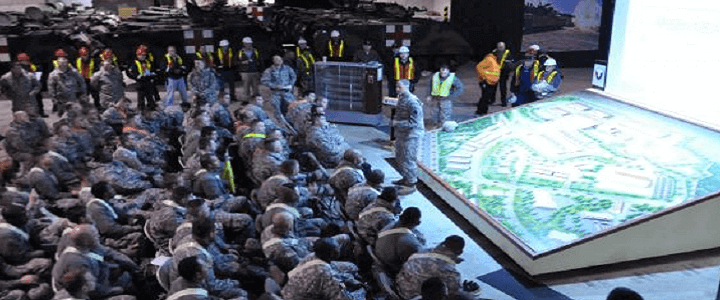As much as we’d like it to be true, Mark Twain never said, “It ain’t what you don’t know that gets you into trouble. It’s what you know for sure that just ain’t so.” Similarly, Isaac Asimov may or may not have said, “People who think they know everything are a great annoyance to those of us who do.” Regardless of origin, both are appropriate thoughts today.
Let’s get this out of the way up front: President Donald Trump did not say that all training in Korea would cease, nor did Vice President Mike Pence contradict him when he spoke with Republican senators about the issue.
The following is an “explainer” to help the uninitiated navigate the hazardous terrain associated with military terminology.
What I said vs. what you thought I said
The most confusing thing (for most civilians, anyway) to emerge from Monday’s summit between Trump and North Korean Chairman Kim Jong-un was the president’s surprise announcement that the U.S. would suspend military exercises with South Korea and other allies while the U.S. and Democratic People’s Republic of Korea progress on the path to denuclearization. To those who pay only marginal attention to the intricacies, or who are simply predisposed to assume that everything Trump says is misinformed, he said much more.
The fundamental problem lies in the fact that the military and the press (and therefore the average civilian) use many terms very differently, which leads to confusion. This confusion leads in turn to the inaccurate conclusion that if a civilian who thinks they’re really following the situation closely is confused by the announcements, then Trump and the Koreans must be as well.
When North Korea raises its objections to “provocative” military exercises, it is referring to the large-scale and very public annual rehearsals the U.S. conducts with the Republic of Korea, not routine unit training. In Joint Publication 1-02, “DOD Dictionary of Military and Associated Terms” the U.S. military defines “exercise” broadly. An exercise, it says, is “A military maneuver or simulated wartime operation in bvcvolving planning, preparation, and execution that is carried out for the purpose of training and evaluation.” That covers a lot of ground.
In the Army alone, there are no fewer than 15 defined types of exercises, ranging in size and complexity from the MAPEX, or map exercise, to a CALFEX, a combined arms live fire exercise. In Korea, there are two large annual combined exercises that give the DPRK heartburn: Ulchi-Freedom Guardian and Key Resolve/Foal Eagle.
Exercise Foal Eagle has taken place for four decades. It involves practicing the deployment of several thousand troops from the U.S. to the ROK to defend against a DPRK invasion. Key Resolve is a command post exercise (CPX) to rehearse the command and control necessary to fend-off a DPRK assault. Ulchi-Freedom Guardian is a largely computer-based simulation (computer-assisted exercise, or CAX). In conjunction with each of these, individual units conduct field training exercises (FTX) to practice their individual warfighting skills (shoot, move, and communicate).
The media calls these “joint exercises,” which they technically are, but not in the way the media means it. To the U.S. military, “joint” means two or more U.S. military services, like the Army and Air Force, working together. When the U.S. trains with an ally, it’s a “combined” exercise (not to be confused with “combined arms,” which means military branches like armor, infantry, and artillery working together). So you can see how anyone not intricately familiar with the peculiarities of military jargon could get confused… quickly.
Pence, the Senate, and the Press
Individual units conduct field training exercises almost every day in Korea, and you don’t see the DPRK government making a stink. Tanks, infantry, artillery, attack helicopters, fighters aircraft, and transport planes practice the art of war constantly. These small-scale maneuvers are not the issue.
While we insist that the large-scale combined exercises are rehearsals for defending against a Northern attack, the Northerners themselves view them as rehearsals for an invasion of our own. So Trump, for better or worse, agreed to postpone them — as long as we perceive the North Koreans to be making progress towards denuclearization.
Even members of Congress, though, were a little uncertain as to what the president meant, so the vice president spoke with Republican senators to reassure them. Given the political media’s unfamiliarity with military terminology, and their proclivity to cast everything in the most negative light possible, it was quickly spun into yet another (supposed) instance of “Pence contradicts Trump, therefore Trump is an idiot.”
But as demonstrated here, Pence wasn’t contradicting the president. Republican Sen. Cory Gardner of Colorado, the media’s source for the VP’s words, pushed back. He clarified on Twitter that the VP was talking about “regular readiness training and training exchanges,” and that “while this [sic] readiness training and exchanges will occur, war games will not.”
Commenters without the slightest idea of what they’re talking about promptly took to their keyboards to “ratio” the good senator, in turn annoying those of us who know what we’re talking about. Such is the state of political discourse in America today.
We can argue all day long, and well into the night, over whether or not Trump’s decision to halt the combined U.S./ROK exercises is the wisest course of action. But let’s not be deliberately obtuse (a more and more common occurrence these days) just so we can “dunk on our enemies.”
Because the real enemy sits north of the 38th Parallel, not at the other end of a Twitter thread.




